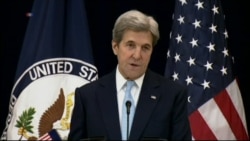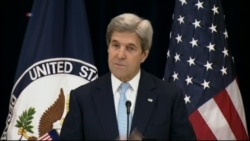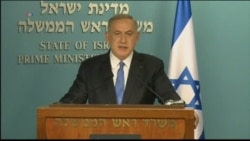U.S. Secretary of State John Kerry unveiled broad guidelines Wednesday for an eventual peace deal between Israel and the Palestinians, warning that a two-state solution to the conflict is in "serious jeopardy."
In an hour-long speech at the State Department, Kerry also defended the U.S. decision last week to abstain from a United Nations Security Council resolution that condemned Israeli settlements.
The vote at the U.N. "was about preserving the two-state solution," said Kerry, rejecting criticism that the U.S. was betraying its longtime ally, Israel. "That's what we were standing up for - Israel's future as a Jewish and democratic state." He noted that the vote was "in accordance" with U.S. values.
WATCH: Kerry on UN resolution
No major new proposals were included in the six parameters outlined in Kerry's speech. Rather, the address was aimed at preserving the generally agreed upon framework of a two-state solution that has been embraced by the last several U.S. administrations.
Among the principles were a "secure and recognized international border" between Israel and a "viable and contiguous Palestine," as well as an end to Israel's occupation of Palestinian territory. Kerry also said a successful two-state solution must provide a "just, agreed, fair and realistic solution" to the Palestinian refugee crisis, declare Jerusalem as a capital for both states, and satisfy Israel's security needs.
WATCH: Kerry on two-State solution
While Kerry stressed that Israel will always be a U.S. ally, he accused Israeli Prime Minister Benjamin Netanyahu of allowing Israel to slip into a state of "perpetual occupation."
"Here is the fundamental reality: if the choice is one state, Israel can be either Jewish or democratic, but it cannot be both," said Kerry, warning that the status quo is leading toward an "irreversible one-state reality" that "most people don't actually want."
Backlash
The stern rebuke of Israel, which comes in the final days of Barack Obama's presidency, prompted a fierce backlash from Israeli leaders.
"Like the Security Council resolution that Kerry advanced in the U.N., his speech tonight was skewed against Israel," Netanyahu said in a statement after the speech. "For over an hour, Kerry obsessively dealt with settlements and barely touched upon the root of the conflict - Palestinian opposition to a Jewish state in any boundaries."
In his own statement, Palestinian President Mahmoud Abbas reaffirmed his commitment to the two-state solution, saying he is willing to restart peace talks if Israel first agrees to a settlement freeze.
The next step is likely to be determined during the administration of President-elect Donald Trump, who has emerged as a staunch ally of Netanyahu.
In a tweet Wednesday, Trump lashed out at the Obama administration for its treatment of Israel.
"We cannot continue to let Israel be treated with such total disdain and disrespect. They used to have a good friend in the U.S., but not anymore," Trump said in a tweet, adding: "Stay strong Israel, January 20th is fast approaching."
The Israeli-Palestinian issue was a main focus for Kerry when he took the top post at the State Department in February 2013, but years of negotiations, including some intense periods of shuttle diplomacy, have failed to yield an agreement.
One lingering obstacle has been Israel's continued construction of settlements in areas the Palestinians see as part of a future state.
That issue rocketed back to the forefront with last week's U.N. vote.
The U.S. move to abstain from the vote effectively allowed unanimous passage of the resolution.
Israel criticizes US abstention
Netanyahu, who has had a cool relationship with President Obama, has called the resolution "shameful'' and accused the U.S. of playing an active role in its passage.
WATCH: Netanyahu on 'Profound Disagreement' With US
The prime minister also said he has "incontestible" evidence showing that the U.S. helped craft the resolution and pushed for its passage. U.S. officials have rejected that notion.
Israeli officials also have launched a series of diplomatic retaliatory measures against nations and other organizations who supported the U.N. resolution
However, in a move aimed at cooling tensions, an Israeli committee on Wednesday postponed a planned vote on permits to construct hundreds of new settler homes in occupied East Jerusalem.
WATCH: Netanyahu on Where Focus Should Be
Hanan Rubin, a member of the Jerusalem Planning and Housing Committee, said the vote was taken off the agenda for Wednesday at the request of Prime Minister Benjamin Netanyahu. The proposal involved 492 new homes in the Ramot and Ramat Shlomo neighborhoods located in areas Israel captured during the 1967 war.
Hours later, a Jerusalem municipal panel approved the construction of a separate four-story building for Jewish settlers in a Palestinian neighborhood of Silwan, located in East Jerusalem.
Washington has long said it opposes Israeli settlements, calling them an obstacle to peace, but the U.S. has generally used its Security Council veto to protect Israel from censure.
















